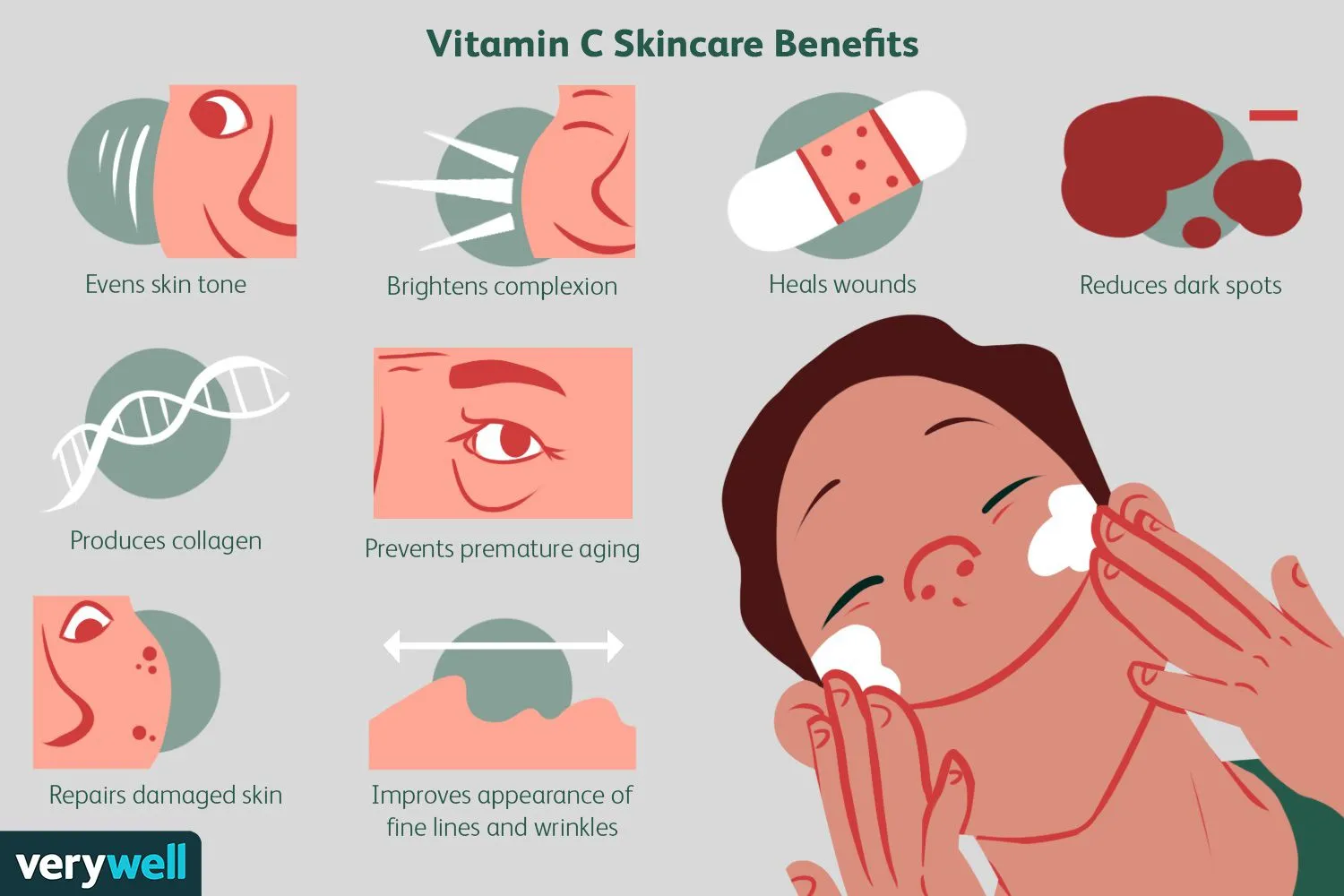What is Vitamin C and How Does it Benefit Skin?
Vitamin C, also known as ascorbic acid, is a potent antioxidant that plays a crucial role in maintaining overall health and, importantly, promoting healthy skin. This essential nutrient is not just a buzzword in the skincare industry; it’s a scientifically-backed compound with numerous benefits. It helps protect the skin from environmental stressors like pollution and sun exposure, which can lead to premature aging and skin damage. Furthermore, vitamin C is essential for collagen synthesis, a protein that gives skin its structure and elasticity. Adequate collagen production is vital for maintaining youthful skin and reducing the appearance of fine lines and wrinkles. Incorporating vitamin C into your skincare routine can significantly improve the skin’s texture and overall appearance, making it a valuable asset for anyone aiming for radiant and healthy skin.
The Role of Vitamin C in Skin Whitening
Vitamin C’s effectiveness in skin whitening stems from its ability to inhibit melanin production. Melanin is the pigment responsible for the color of our skin, and overproduction of melanin can lead to hyperpigmentation, dark spots, and an uneven skin tone. By interfering with the enzyme tyrosinase, which is essential for melanin synthesis, vitamin C helps to reduce the appearance of existing dark spots and prevents new ones from forming. This action results in a brighter, more even complexion. Moreover, vitamin C’s antioxidant properties protect skin cells from damage caused by free radicals, which can exacerbate skin discoloration and contribute to aging. This dual action – reducing melanin production and protecting against environmental damage – makes vitamin C a powerful ingredient for achieving a lighter and more luminous skin tone. Regular use can lead to noticeable improvements in skin clarity and a reduction in unwanted pigmentation.
Understanding Hyperpigmentation and Vitamin C’s Impact

Hyperpigmentation, characterized by dark patches on the skin, is a common skin condition that can result from various factors, including sun exposure, hormonal changes, inflammation, and acne. These dark spots are often a result of an overproduction of melanin in specific areas of the skin. Vitamin C directly addresses this issue by targeting the melanocytes, the cells responsible for producing melanin. The antioxidant properties of vitamin C also assist in reducing inflammation, a significant contributor to hyperpigmentation. By minimizing inflammation and protecting against further damage, vitamin C not only helps to fade existing dark spots but also prevents future pigmentation issues. The consistent use of vitamin C can effectively manage and reduce the appearance of hyperpigmentation, leading to a more uniform skin tone and a healthier complexion. This is especially beneficial for those struggling with conditions like melasma or post-inflammatory hyperpigmentation.
How Vitamin C Works to Lighten Skin
Vitamin C lightens skin through a multifaceted approach. At its core, it inhibits the activity of tyrosinase, the enzyme responsible for melanin production. By doing so, vitamin C reduces the amount of melanin synthesized, leading to a gradual lightening of the skin. Beyond this primary mechanism, vitamin C also acts as an antioxidant, neutralizing free radicals that can cause skin damage and exacerbate hyperpigmentation. These free radicals, often generated by sun exposure and pollution, can trigger inflammation and stimulate melanin production. By mitigating this damage, vitamin C prevents further darkening of the skin. Additionally, vitamin C supports healthy cell turnover, which helps to shed the pigmented cells on the surface, promoting the emergence of brighter, newer skin. This combination of actions makes vitamin C an effective ingredient for those seeking to lighten their skin and improve overall skin clarity.
Choosing the Right Vitamin C Product
Selecting the right vitamin C product is crucial for achieving the desired results. The efficacy of a vitamin C product depends on several factors, including the form of vitamin C used, the concentration, and the product’s formulation. Ascorbic acid (L-ascorbic acid) is the most researched and potent form, but it can be unstable and may oxidize quickly. Look for products that are packaged in dark, air-tight containers to maintain stability. Other stable forms of vitamin C include sodium ascorbyl phosphate, magnesium ascorbyl phosphate, and ascorbyl palmitate, although these may be less potent. The concentration of vitamin C should typically be between 10% and 20% for optimal effectiveness. Consider other ingredients in the formulation, such as vitamin E and ferulic acid, which can enhance the antioxidant benefits and stabilize the vitamin C. Always choose products from reputable brands that clearly state the form and concentration of vitamin C used, ensuring you’re investing in a product that suits your skin type and concerns.
Vitamin C Serums Creams or Oils

Vitamin C is available in various forms, including serums, creams, and oils, each offering different advantages and suitability for different skin types. Serums are often preferred due to their lightweight texture and ability to penetrate the skin more effectively. They typically contain higher concentrations of vitamin C and are quickly absorbed, making them ideal for daily use. Creams are often richer and more moisturizing, which can be beneficial for individuals with dry skin. They can also include additional ingredients to support skin hydration and barrier function. Oils, such as those containing tetrahexyldecyl ascorbate (THDA), are less common but can provide a lipid-soluble form of vitamin C. The choice between these formats depends on your skin type and preferences. Serums are generally recommended for those with oily or acne-prone skin, while creams can provide extra hydration for dry skin. Always start with a lower concentration to assess your skin’s tolerance before increasing usage.
Topical Vitamin C Application Techniques
Proper application of vitamin C is essential for maximizing its benefits. Begin by cleansing your face thoroughly to remove any makeup, dirt, or oil. Apply a few drops of the serum or a small amount of cream to your fingertips. Gently pat the product onto your face and neck, avoiding the eye area. Allow the product to absorb fully before applying any other skincare products, typically for a few minutes. Many experts recommend using vitamin C in the morning, as it can provide protection against environmental damage throughout the day. Follow up with a broad-spectrum sunscreen to enhance protection and boost the efficacy of vitamin C. Consistency is key: apply vitamin C daily for best results. If you experience any irritation, reduce the frequency of application or consult with a dermatologist. Remember to store your vitamin C product properly, away from direct sunlight and heat, to maintain its effectiveness.
Combining Vitamin C with Other Skincare Ingredients
Vitamin C can be effectively combined with other skincare ingredients to boost its benefits. For example, vitamin E enhances vitamin C’s antioxidant properties, providing greater protection against free radical damage. Ferulic acid is another antioxidant that stabilizes vitamin C and enhances its effectiveness. When using vitamin C with other active ingredients, consider the order of application. Generally, apply vitamin C after cleansing and before other treatments or moisturizers. Avoid combining vitamin C with benzoyl peroxide, as it can oxidize and reduce the effectiveness of vitamin C. Retinoids, such as retinol, can be used in combination with vitamin C, but it’s best to use them at different times of the day or on different days to minimize potential irritation. Always introduce new products gradually and monitor your skin’s response to avoid adverse reactions. This can help maximize the benefits and maintain a healthy skin routine.
Vitamin C and Sun Protection

Vitamin C significantly enhances the effectiveness of sunscreen by providing additional protection against UV-induced skin damage. While sunscreen primarily shields the skin from UV rays, vitamin C offers an extra layer of defense by neutralizing free radicals generated by sun exposure. This synergistic effect helps to prevent premature aging, reduce the risk of sunspots, and maintain a more even skin tone. Applying vitamin C serum before sunscreen maximizes its benefits. The antioxidant properties of vitamin C help prevent sunburn and reduce the inflammatory response of the skin to sun exposure. By incorporating vitamin C into your morning skincare routine and consistently applying broad-spectrum sunscreen, you create a powerful shield against environmental damage and promote healthy, radiant skin. This combined approach offers the best protection for maintaining skin health and preventing sun-related issues.
Potential Side Effects and Precautions
While vitamin C is generally safe for most people, some may experience side effects, particularly when using high concentrations. Common side effects include mild irritation, redness, tingling, or a slight burning sensation, especially when first starting to use the product. For sensitive skin, it is advisable to start with a lower concentration and gradually increase as tolerated. In rare cases, some individuals may experience allergic reactions. If you notice severe irritation, swelling, or itching, discontinue use and consult a dermatologist. Always perform a patch test before applying vitamin C to your entire face, especially if you have sensitive skin. Store vitamin C products in a cool, dark place to prevent oxidation, which can reduce their effectiveness and increase the risk of irritation. Be mindful of the product’s expiration date and discard any products that have changed color or consistency.
Real Results and Testimonials
Countless users have reported positive results from incorporating vitamin C into their skincare routines. Testimonials often highlight improvements in skin brightness, a reduction in dark spots, and a more even skin tone. Many users note that their skin appears more radiant and youthful. Anecdotal evidence suggests that vitamin C can significantly improve the appearance of sun-damaged skin and hyperpigmentation. Real-life before-and-after photos often showcase visible improvements in skin clarity and texture. Individual results may vary depending on the form of vitamin C, the concentration, and skin type, but the widespread positive feedback underscores the effectiveness of this ingredient. These testimonials provide valuable insights into the practical benefits of vitamin C and motivate others to explore the potential of this powerful antioxidant in their own skincare regimens. When looking for vitamin C, consider these reviews and before-and-after pictures.
Maintaining Results and Long Term Skincare

Maintaining the results of using vitamin C for skin whitening and overall skin health requires a consistent and holistic approach to skincare. Continue using vitamin C regularly as part of your daily routine, but always use sunscreen. Incorporate other beneficial skincare products, such as moisturizers, retinoids, and exfoliants, to complement the effects of vitamin C and address other skin concerns. Make sure you use all products as instructed, and follow the correct order of application. Adopt a healthy lifestyle, including a balanced diet rich in antioxidants and other essential nutrients, to support skin health from the inside out. Drink plenty of water to keep your skin hydrated. Schedule regular check-ups with a dermatologist to monitor your skin’s progress and to address any new concerns or conditions. Long-term skincare is an ongoing process, so building a sustainable and customized routine will help maintain a bright, even-toned complexion and overall skin wellness.
